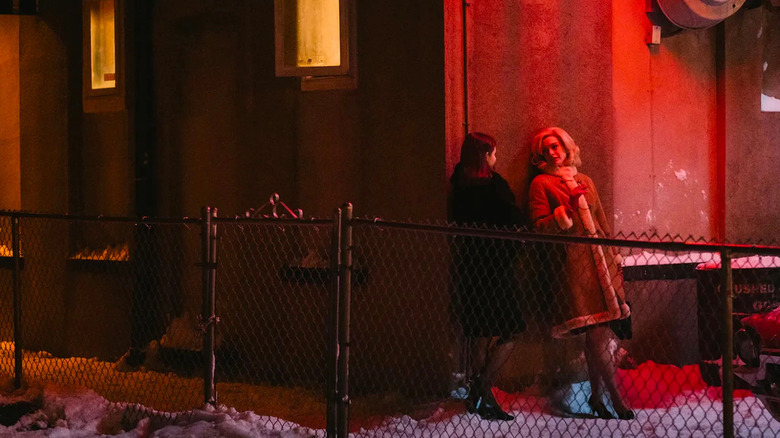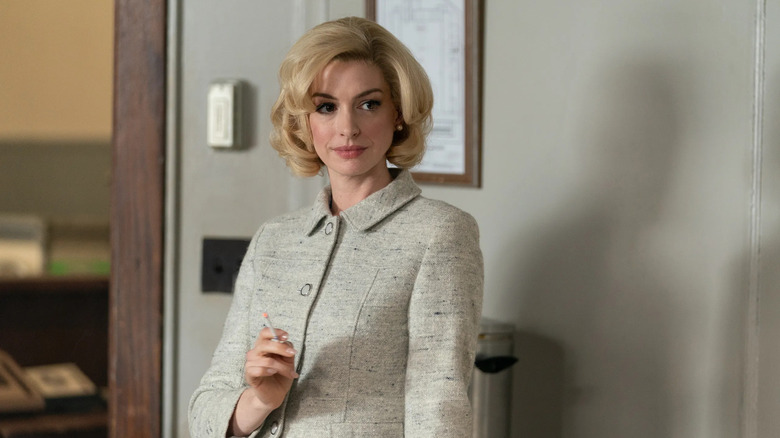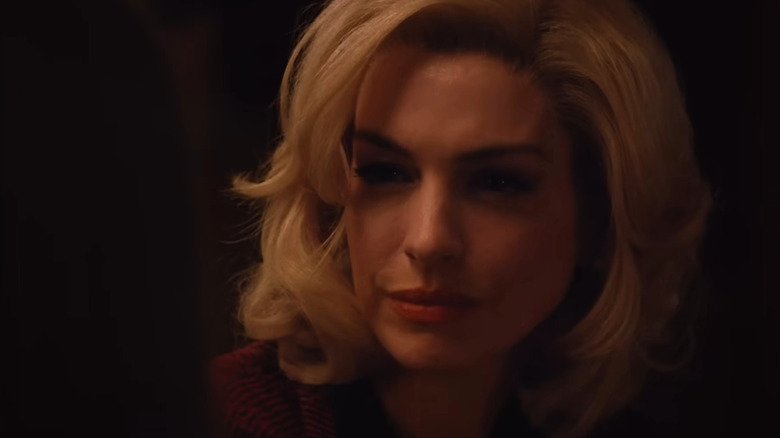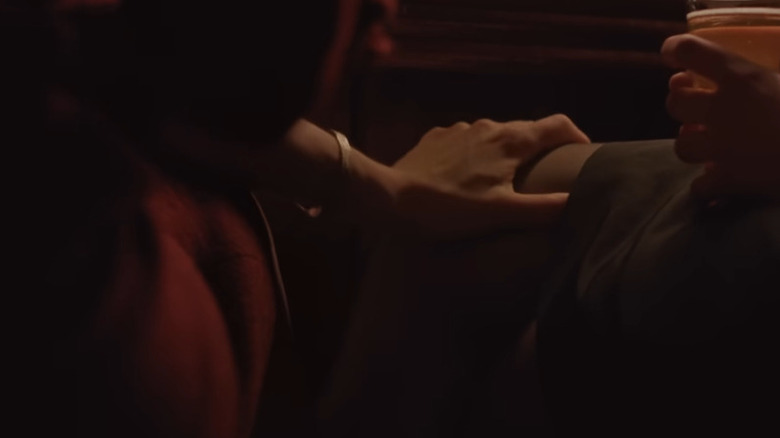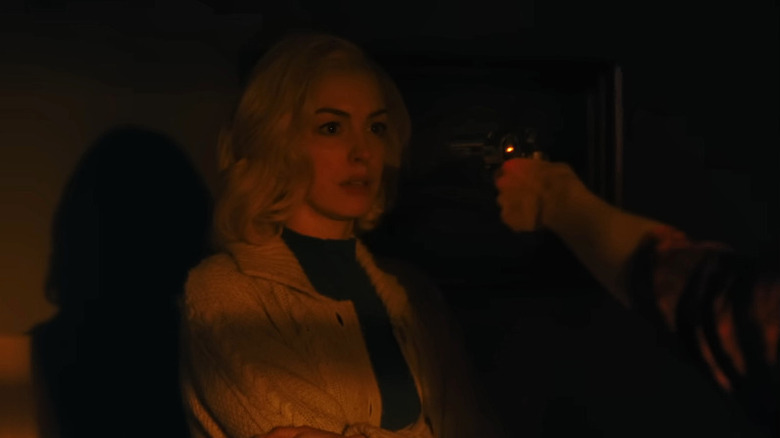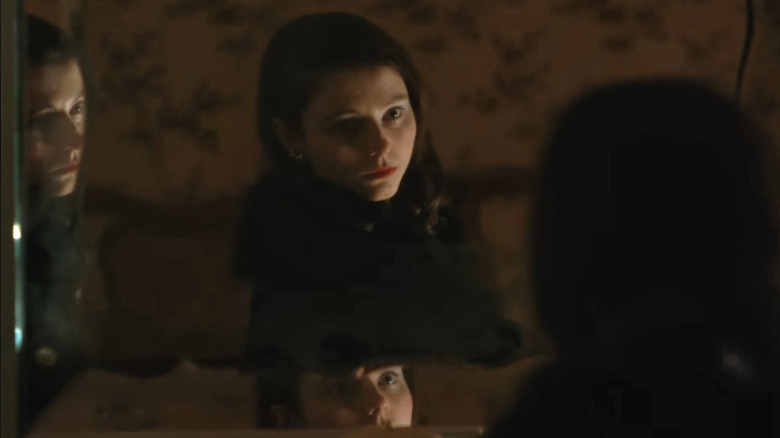Eileen Ending Explained: This Ain't Hitchcock
This article contains major spoilers for "Eileen."
A lot of people know what they want when they buy a ticket to see a movie, or buy it on physical media, or click on a title in the streaming service of their choice. If it looks like a romantic comedy, they expect a romantic comedy, and they're likely to be disappointed if they get something else instead. This is where the concept of genre comes from, the desire to categorize films based on tangible qualities, so the audiences in the mood for certain storytelling or artistic styles can find what they're looking for. It's comforting to have at least some idea of what you're going to get, even if you don't know how exactly you are going to get it.
But then there are films like William Oldroyd's "Eileen."
"Eileen" has elements of crime movies and thrillers and prison dramas and coming of age stories, but it's none of those things, and it's also all of those things. If you decide to watch "Eileen" and expect a film noir, you may leave the film dissatisfied because it doesn't quite fit that description. If you expect a drama about a repressed young woman's sexual awakening, then you might also find the movie a little stymying.
Instead, Oldroyd's film is specifically design to undermine your expectations, and confront you with characters and storylines and themes that will probably make you squirm. If you're looking for any kind of comfort, "Eileen" isn't it. But art doesn't have to be comfortable. Indeed, sometimes its better to shake the audience out of complacency in order to make a serious, and disturbing point.
Come on, Eileen
"Eileen," based on the award-winning novel by Ottessa Moshfegh, stars Thomasin McKenzie as a young, repressed wallflower who lives in the shadow of her dead mother and becomes obsessed with another, more confident and sexually aggressive woman in the 1960s. Over the course of the film they dance together and become oddly close, and McKenzie's character begins to adopt the habits and traits of the object of her obsession.
If that sounds an awful lot like Edgar Wright's "Last Night in Soho," you're very observant. To paraphrase the great Dr. Doofenshmirtz, "If I had a nickel for every time Thomasin McKenzie played a young, repressed wallflower who lives in the shadow of her dead mother and becomes obsessed with another, more confident and sexually aggressive woman in the 1960s, and over the course of the film they dance together and become oddly close, and McKenzie's character begins to adopt the habits and traits of the object of her obsession, I'd have two nickels. Which isn't a lot, but it's weird that it happened twice. Right?
But whereas Wright's film was a stylish supernatural thriller, "Eileen" is a subdued character study. McKenzie, who plays the title character, lives in Massachusetts in the 1960s with her alcoholic, emotionally abusive, retired police chief father, played by Shea Whigham from "Spider-Man: Across the Spider-Verse," where he also played a policeman struggling to connect with his daughter after the death of her mom. Eileen works at a local juvenile detention facility, a job where nobody likes her, and she spends most of her time indulging her many unrealized sexual fantasies.
The perfect metaphor for Eileen's life is her car, which vents deadly exhaust into the cabin whenever she drives it. Everything that's supposed to make her life easier, or even just keep her going, is slowly killing her.
I swear, what this means
Eileen's life changes when she meets the prison's new psychiatrist, played by Anne Hathaway. She dresses like Audrey Hepburn and styles her hair like the icy blonde lead in an Alfred Hitchcock movie. Heck, her name is even Rebecca, and she was intentionally named after the title character in Alfred Hitchcock's Oscar-winning film.
Eileen befriends Dr. Rebecca Saint John, a confident woman who takes a shine to her young co-worker, and even invites her out for drinks. Rebecca rebukes the advances of men who want to interrupt their girls' night out, even elbowing one of them in the face when he tries to cut in on their dancing. Rebecca touches Eileen's leg in a manner Eileen construes as flirtatious. When Rebecca leaves, Eileen grabs her discarded, lipstick-smeared cigarette and lovingly puts it to her own lips. She only just started smoking, and that's because Rebecca smokes.
The backdrop of criminality — the boy's prison, the alcoholic ex-cop father — creates the impression that Rebecca is a sort of femme fatale, a seductress tempting Eileen into sexual danger, or possibly even an illegal enterprise. The introduction of a subplot about a prisoner named Lee Polk (Sam Nivola), who stabbed his own cop father to death in his sleep next to his sleeping mother seems to have put ideas into Eileen's head. She starts fantasizing about using her father's gun, on herself or on him. Is Rebecca her means of escaping her miserable life, or is she just leading Eileen on a path to more misery?
This moment means everything
The film smoothly moves in a straight line towards Christmas Eve, when Rebecca asks Eileen to visit her for the holiday. Eileen gets dolled up, thinking it's a date, and arrives at Rebecca's house. It's not what she pictured. It's a wreck. Rebecca herself seems strangely nervous. And when she confesses that unlike the people who work at the prison, or any of the people in their lives, she has her own ideas. She thinks Eileen has her own ideas too, and Eileen agrees.
But instead of a declaration of love, or even lust, Rebecca confides that her ideas are about Lee Polk. The boy who killed his own father, and in a very brutal way, while his father was sleeping. While his own mother was in bed next to him. His own mother, who did nothing to stop it.
"What would make a person want to kill their father?" Rebecca asks.
"Everybody wants to kill their father," Eileen responds, simply.
"No they don't," Rebecca says, surprised. "Who told you that?"
Rebecca finally reveals the truth. This is not her house. This is Mrs. Polk's house. Lee confided in Dr. Saint John that his father sexually abused him, and when she went to Mrs. Polk's house to confront her about it, the conversation got heated. They fell down the stairs, and in the heat of the moment she tied Mrs. Polk up.
And now she needs Eileen's help.
Her in that dress, those thoughts were confessed
Rebecca's plan is to get Mrs. Polk to confess to her husband's crimes, in the hopes of helping Lee out of his incarceration, but she needs Eileen to be a witness to the confession. Eileen not only agrees, she helps. Earlier in the film she took her father's gun, which he had been waving at school children, and hid it in the glove box of her car. With it she threatens Mrs. Polk (Marin Ireland, "The Boogeyman"), who finally caves in and reveals her horrible truth.
In a long, painful speech, she explains that when she found out what her husband was doing, she couldn't believe it, but her relationship with her husband was so precious to her that she decided not only to ignore it, but to aid and abet his abuse. It's a horrifying speech. So horrifying that Eileen shoots her. Rebecca panics and forces Mrs. Polk to swallow pills to knock her unconscious. Rebecca's whole, not-very-good plan has collapsed, and Eileen proposes a new one. They'll move Mrs. Polk to Eileen's house, where he father is unconscious, and make it look like he killed her. Then, Eileen and Rebecca can run away together.
They drag Mrs. Polk to Eileen's car, and Rebecca says she'll clean up the evidence and meet Eileen at her house. Eileen goes home and waits. And waits. And waits. Rebecca isn't coming.
So she drives out to the middle of nowhere and locks Mrs. Polk in the car with the engine running, so the engine exhaust will kill her. Then Eileen walks up to the highway and hitchhikes. And she drives out of her old life, into parts unknown.
Verging on dirty
All the elements leading up to the third act in "Eileen" set the audience up for an erotic seduction, a salacious crime story, or both. But there is no erotic seduction. It's quite possible Eileen misread those signals. And while there is a crime story, it's not salacious. It's grotesque and sad. You could even call it anticlimactic, but these revelations and resolutions were sudden and disquieting for a reason.
"Eileen" pulls a fast one on the audience, teasing conventional genre thriller elements before forcing us to confront the actual, terrifying realities of child abuse. Lee Polk went through unspeakable horrors, and we learn in a vile monologue just how easy it was for his own mother to stand by and let his father commit monstrous crimes, just because it made her own life more convenient. These are not the thrills of criminality. This is the indefensible way abuse works.
While Eileen's father may not be as despicable as Lee Polk's, we've seen over the course of the film just how much his controlling behavior, his damning words, and his selfishness have hurt Eileen too. We know it's led her to consider ending her own life, or his. She comes extremely close to destroying his life as best she can. That she escapes by fleeing his house instead is almost incidental. If Rebecca hadn't abandoned her, Eileen would have become another version of Lee Polk. At least now she'll have a chance to live life outside of that horrible influence. It might not be a happy ending, but it's as close as she can get.
So if you view "Eileen" as a crime movie, or a film noir, you're going to find the film betrays you. But if you view the film as a jarring splash of icy, grim reality, you'll find instead a film that defies convention with singular, disturbing purpose.
"Eileen" is now in theaters.
